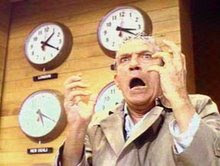So for the 25% of Australians who look up to a former member of the Hitler youth, today is a big day. They may get a saint. What is a saint? According to www.catholiceducation.org, a saint is:
- "the standard operating model for human beings."
Operating model sounds like operating thetan. Smells of L. Ron here.
- "Christ’s bride, totally attached, faithful, dependent."
And we thought they were against same sex marriage.
According to www.catholic-pages.com, saints are
- "persons in heaven (officially canonized or not), who lived lives of great charity and heroic virtues." So why bother with the whole canonizing circus? This page then goes on about how JP II proclaimed at least 278 saints.
It also states that "In official Church procedures there are three steps to sainthood: one becomes Venerable, Blessed and then a Saint. Venerable is the title given to a deceased person recognized as having lived heroic virtues. To be recognized as a blessed, and therefore beatified, in addition to personal attributes of charity and heroic virtue, one miracle, acquired through the individual's intercession, is required. Canonization requires two, though a Pope may waive these requirements. Martyrdom does not usually require a miracle." No need for miracles, just get yourself killed in action.
For those 25%, the miracles are probably going to be believed as such without rigorous questioning. For the other 75%, surely we should be getting good journalism asking the question, are these events really miracles? i.e. can't be explained unless evoking a god. I've only seen two articles ask this question, here and here. All other media has been unquestioning and pandering.
I also question the claim that they have been using science to prove these are miracles. They obviously have no idea what science is. Science doesn't prove anything. It can only measure how probable an explanation is. It's a way to find out the most probable explanation using the evidence available. It tries not to bring in unjustified assumptions such as unfalsifiable supernatural beings. So if they were really using science, they would come to the conclusion that the most probable reason for the so called cancer miracles are chance remissions. These do occur.
So to paraphrase a cook who some thought wore a brown shirt, "No miracle for you!!!".
Friday, February 19, 2010
Monday, February 01, 2010
Nearly five years
I've just read an article in the Sunday Age Life magazine that resonated with me. Sarah Wilson wrote about how she doesn't drink anymore and how at parties and functions she has to explain her reason (it used to be a health one). I know exactly what she means. I've also explained it as a health reason, which it was. But why in our society do you need to have some problem to stop drinking? It's a sad indication of how endemic alcohol is in our culture.
It's nearly five years since my last drop and at the moment I have no inclination to imbibe again. Just like Sarah, I've found this an interesting experiment, both as an onlooker of society and as a study of myself. I've changed during this time, having to be discover who I am and to be myself without the use of a crutch. Now in conversations I want to delve deeper in topics and question and argue points. The problem being, sometimes others in the conversation, if they have had too much to drink, stop making rational points and the conversations begin to stagnate and bore. At other times, the conversationalists have little to talk about because they only have a narrow range of topics they can discuss, mainly work and, ah, work. Their solution, grab a beer.
I've been asked if I'll ever drink alcohol again, and the answer is I don't know. But one thing is for sure, it won't be because of the reasons I over indulged in the past.
It's nearly five years since my last drop and at the moment I have no inclination to imbibe again. Just like Sarah, I've found this an interesting experiment, both as an onlooker of society and as a study of myself. I've changed during this time, having to be discover who I am and to be myself without the use of a crutch. Now in conversations I want to delve deeper in topics and question and argue points. The problem being, sometimes others in the conversation, if they have had too much to drink, stop making rational points and the conversations begin to stagnate and bore. At other times, the conversationalists have little to talk about because they only have a narrow range of topics they can discuss, mainly work and, ah, work. Their solution, grab a beer.
I've been asked if I'll ever drink alcohol again, and the answer is I don't know. But one thing is for sure, it won't be because of the reasons I over indulged in the past.
Subscribe to:
Comments (Atom)
